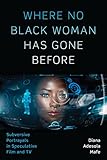Where No Black Woman Has Gone Before : Subversive Portrayals in Speculative Film and TV / Diana Adesola Mafe.
Material type: TextPublisher: Austin : University of Texas Press, [2021]Copyright date: ©2018Description: 1 online resource (185 p.)Content type:
TextPublisher: Austin : University of Texas Press, [2021]Copyright date: ©2018Description: 1 online resource (185 p.)Content type: - 9781477315248
- Black people on television
- Blacks on television
- Fantasy films -- History and criticism
- Fantasy television programs -- History and criticism
- Horror films -- History and criticism
- Horror television programs -- History and criticism
- Motion pictures -- History -- 21st century
- Science fiction films -- History and criticism
- Science fiction television programs -- History and criticism
- Sex role in motion pictures
- Sex role on television
- Television programs -- History -- 21st century
- Women on television
- Women, Black, in motion pictures
- PERFORMING ARTS / General
- 791.43/652996073 23
- PN1995.9.N4 M25 2018
- PN1995.9.N4 M25 2018
- online - DeGruyter
| Item type | Current library | Call number | URL | Status | Notes | Barcode | |
|---|---|---|---|---|---|---|---|
 eBook
eBook
|
Biblioteca "Angelicum" Pont. Univ. S.Tommaso d'Aquino Nuvola online | online - DeGruyter (Browse shelf(Opens below)) | Online access | Not for loan (Accesso limitato) | Accesso per gli utenti autorizzati / Access for authorized users | (dgr)9781477315248 |
Browsing Biblioteca "Angelicum" Pont. Univ. S.Tommaso d'Aquino shelves, Shelving location: Nuvola online Close shelf browser (Hides shelf browser)

|

|

|

|

|

|

|
||
| online - DeGruyter The Senses of Democracy : Perception, Politics, and Culture in Latin America / | online - DeGruyter Life in Oil : Cofán Survival in the Petroleum Fields of Amazonia / | online - DeGruyter Public Pages : Reading Along the Latin American Streetscape / | online - DeGruyter Where No Black Woman Has Gone Before : Subversive Portrayals in Speculative Film and TV / | online - DeGruyter Country Music USA : 50th Anniversary Edition / | online - DeGruyter CinemaTexas Notes : The Early Days of Austin Film Culture / | online - DeGruyter A Place of Darkness : The Rhetoric of Horror in Early American Cinema / |
Frontmatter -- Contents -- Acknowledgments -- Introduction: To Boldly Go -- 1. Seeking a Friend for the End of the World: 28 Days Later -- 2. Last One Standing: Alien vs. Predator -- 3. The Black Madonna: Children of Men -- 4. Thank Heaven for Little Girls: Beasts of the Southern Wild -- 5. Intergalactic Companions: Firefly and Doctor Who -- Coda: Final Frontiers -- Notes -- Works Cited -- Index
restricted access online access with authorization star
http://purl.org/coar/access_right/c_16ec
When Lieutenant Uhura took her place on the bridge of the Starship Enterprise on Star Trek, the actress Nichelle Nichols went where no African American woman had ever gone before. Yet several decades passed before many other black women began playing significant roles in speculative (i.e., science fiction, fantasy, and horror) film and television—a troubling omission, given that these genres offer significant opportunities for reinventing social constructs such as race, gender, and class. Challenging cinema’s history of stereotyping or erasing black women on-screen, Where No Black Woman Has Gone Before showcases twenty-first-century examples that portray them as central figures of action and agency. Writing for fans as well as scholars, Diana Adesola Mafe looks at representations of black womanhood and girlhood in American and British speculative film and television, including 28 Days Later, AVP: Alien vs. Predator, Children of Men, Beasts of the Southern Wild, Firefly, and Doctor Who: Series 3. Each of these has a subversive black female character in its main cast, and Mafe draws on critical race, postcolonial, and gender theories to explore each film and show, placing the black female characters at the center of the analysis and demonstrating their agency. The first full study of black female characters in speculative film and television, Where No Black Woman Has Gone Before shows why heroines such as Lex in AVP and Zoë in Firefly are inspiring a generation of fans, just as Uhura did.
Mode of access: Internet via World Wide Web.
In English.
Description based on online resource; title from PDF title page (publisher's Web site, viewed 26. Apr 2022)


